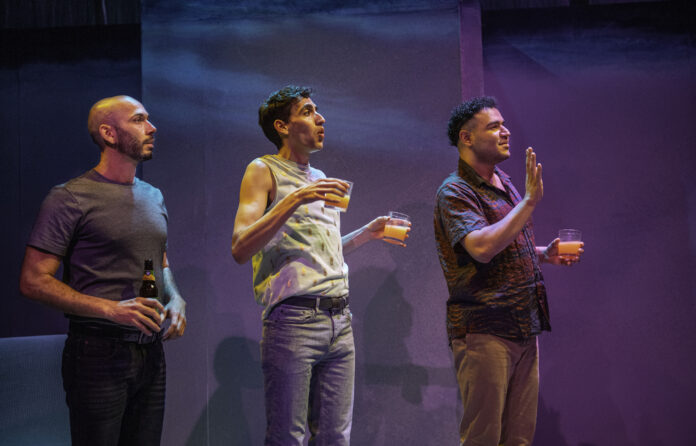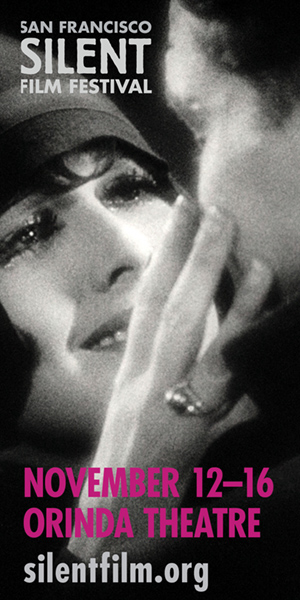It’s a common cliché among certain folks, particularly those who lean to the right, to say “If ya don’t like America, try livin’ in [x country] and see how far you get!” It’s often a safe assumption that the person speaking has never left the US, as the myopic phrase hypocritically implies that the US—stolen from native tribes, built off the backs of African slaves, possessed of staggering wealth gaps—is some utopia of democracy and equality.
I thought of that phrase as I watched Drowning in Cairo, Golden Thread’s new world premiere (through May 1 at Potrero Stage). Adam Ashraf Elsayigh’s time-jumping play, set partially against the backdrop of the Arab Spring, includes its activist character lamenting his country’s rigged voting system in a way US citizens should recognize from recent headlines. (Something all the more frustrating now that Democrats have control, but have done almost nothing to save those Republican-stripped rights.) Considering that and the lack of universal healthcare, the US might not be the worst country, but it certainly isn’t the best.
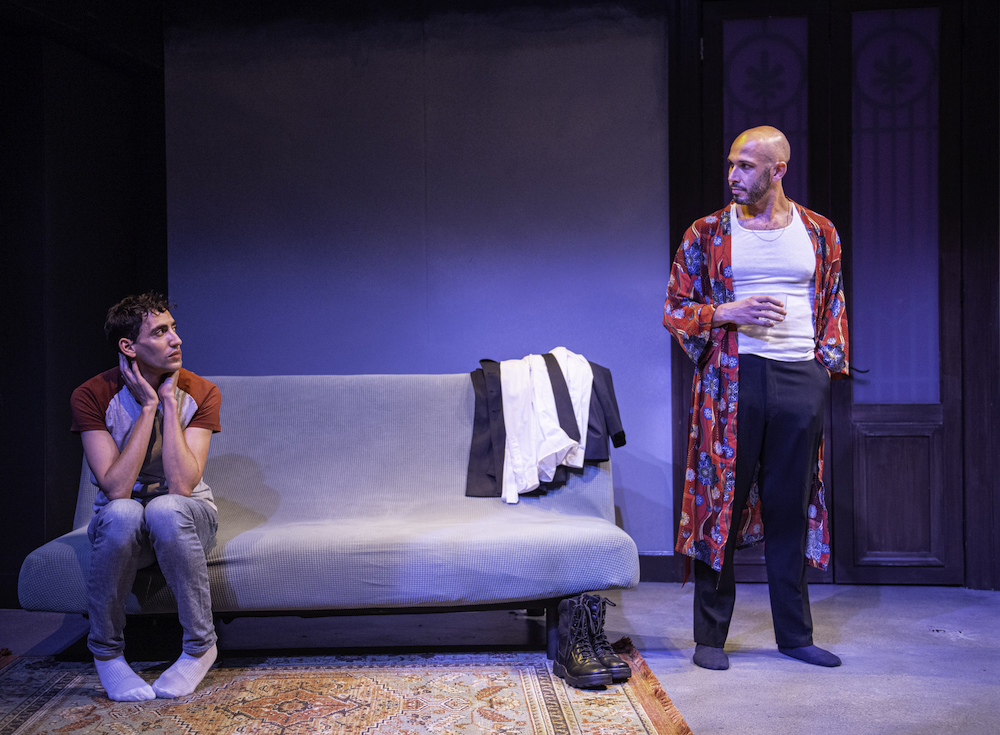
But I digress. Elsayigh’s story chronicles the 16-year relationship of three LGBTQ+ Egyptian Muslims: Mahmoud “Moody” (Amin El Gamal); Khalid (Wiley Naman Strasser); and young Taha (Martin Yousif Zebari). Through narrative leaps backwards and forwards, we see Taha first enter the lives of the other two in 1999, catching them making out and smoking weed in a dorm. Khalid is the son of a prominent Cairo police officer and Moody the son of a wealthy mother. Needless to say, such a discovery would be a scandal almost anywhere, but the consequences in Egypt would be far more lasting.
Still, it’s through this encounter that Taha discovers not only his own homosexuality, but also begins down the path to working with Human Rights Watch. Though he’s given equal time with the flamboyant Moody—a gifted author—and the rigid Khalid, Taha could easily be seen as the audience surrogate. His discovery of the world Moody knows intimately is revealed to us as it is to him. That one of the early scenes takes place at a private gay party on a yacht soon raided by Egyptian police (based on an infamous incident) paints an immersive picture. Both Khalid and Moody use their family connections to cut down their prison time, while Taha serves a three-year sentence.
We follow Taha’s uncertainty of how to be gay and Muslim to see him later become a queer not-quite-elder (he’s still a millennial), sheltering other LGBTQ Egyptians no longer welcome with their families. But whereas the other Khalid and Moody’s on-off relationship pushes the story forward, we never see Taha’s life apart from them.
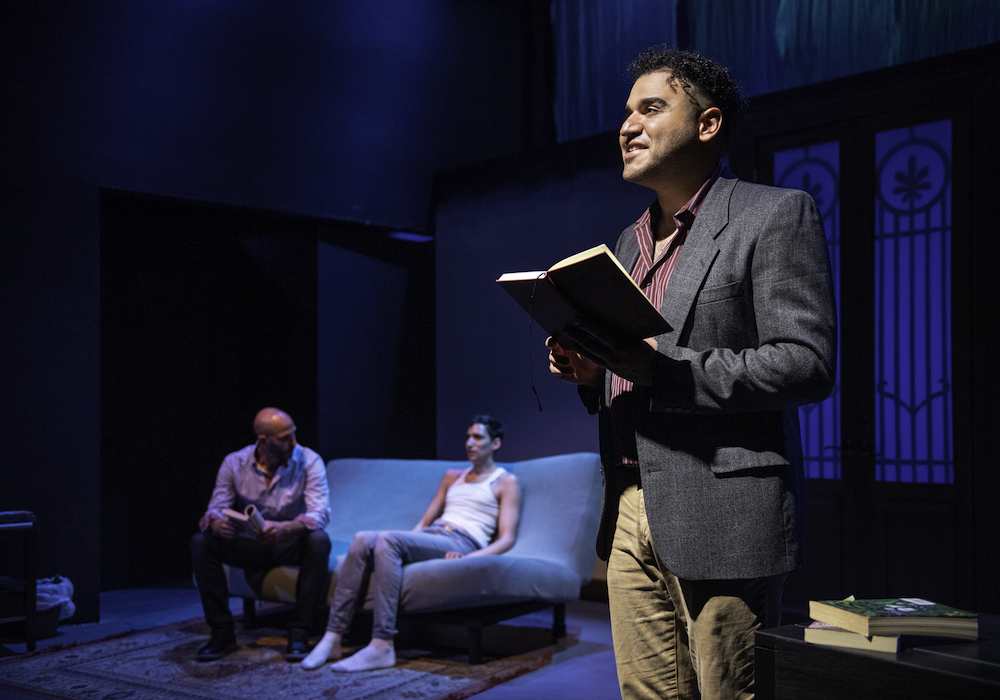
In a way, the trio personify the Freudian model of the human psyche: Moody’s excesses make him the id, embracing his queerness with an almost Oscar Wilde-like indulgence of vices in a conservative country (time passes via projected text and Moody’s music moving from Britney to Gaga). The stern Khalid would be super-ego, quick to quote both scripture and man’s law about the sin he knows he’s committing. And babe-in-the-woods Taha would be the neutral ego, negotiating between dogmatic upbringing and unshakable impulses. True, this could also be said of Khalid—who eventually marries a woman and has a son—but there’s a sort of inevitability to he and Moody’s paths, whereas the fork in Taha’s road is much more malleable.
It’s to the credit of Elsayigh and director Sahar Assaf (Golden Thread’s executive artistic director) that Drowning in Cairo mostly succeeds in avoiding the clichés overtly mentioned in NCTC’s recent PrEP Play. That Moody’s affinity for Michael Cunningham’s AIDS tearjerker A Home at the End of the World plays such a prominent role in both his personal identity and growth as an author may be a bit on-the-nose, but it does reveal how whitewashed those kinds of stories tend to be.
This play is at its best when showing us how these three change with the times and reveal their ambitions, such as how rich boy Moody fancies himself non-political, but is quick to chastise Arab Spring protestors for not including LGBTQ rights in their list of demands. Similarly, Khalid starts off as the scared boy who prays in jail after the boat party, but easily transitions into the married cop and father not even trying to hide his homosexuality from his wife, whom he calls his “best friend.” He wears his hypocrisy as well as he wears his uniform (designed by Becky Bodurtha).
Help us save local journalism!
Every tax-deductible donation helps us grow to cover the issues that mean the most to our community. Become a 48 Hills Hero and support the only daily progressive news source in the Bay Area.
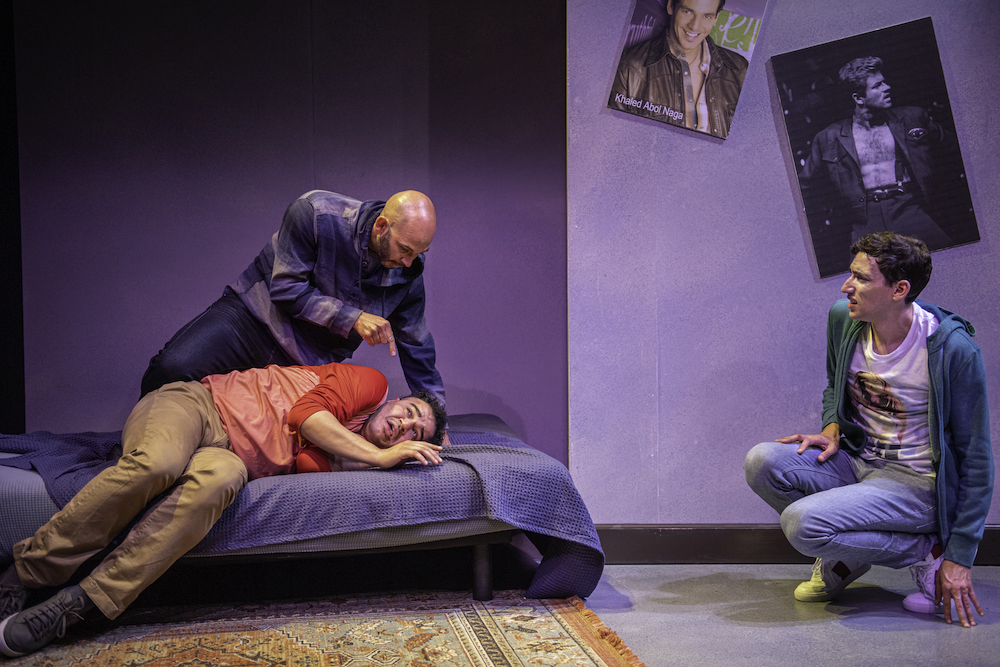
Still, the script suffers from wanting to cover so much ground that it occasionally tries to talk with its proverbial mouth full. What’s more, a revelation of sexual assault appears to be dismissed far too easily. During a discussion of “trauma therapy,” one character directly asks another if he ever committed such assaults, to which the latter answers, “It’s complicated.” What happens well connects to the aforementioned “trauma” discussion, but it paints the answerer in such a way that it’s hard to directly empathize with them for the remainder of the play. Once certain lines are crossed, it isn’t easy to forgive.
It’s also to the Assaf’s credit that her collaborators are up to the task of telling a not-easy story like this. The slender frame of Amin El Gamal works in favor of the idea that, despite his hedonism, Moody is someone who frequently needs to be protected, both from himself and others. Wylie Strasser embodies the rigidity of Khalid to such a point that it sometimes seems hard for him to shake it in moments where he’s supposed to really let loose. Martin Zebari certainly finds the heart of Taha through his long journey, though it’s hard to buy the bearded actor as a teen in early scenes. And Assaf gets a lot of mileage out of Mikiko Uesugi’s spartan-looking set, transitioning among a dorm room, a speaking hall, and the protest-filled streets of Cairo.
With a decent vax check and checkered seating inside, Golden Thread did well to make the Potrero Stage the very sort of safe space Taha often tries to make he and Moody’s home. Drowning in Cairo‘s portrayal of living in a time of civil unrest and diminishing rights makes it as timely as ever, and adds a welcome alternative to Western-made “Middle East” tales, even if this one clearly resembles one. It’s an imperfect telling of an intimate story about how queer identity is vulnerable in any major nation.
DROWNING IN CAIRO runs until May 1 at the Potrero Stage, San Francisco. Tickets and info here.

